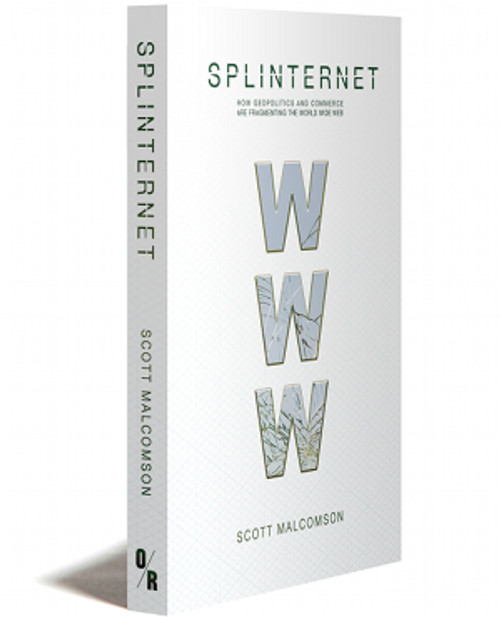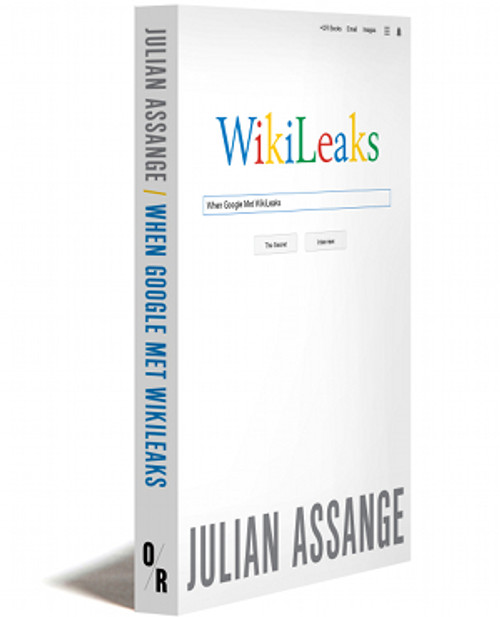Splinternet
Read "The Web in the World", an interview with author Scott Malcomson about Splinternet"
about the bookabout
There's always been something universalizing about the Internet. The World Wide Web has seemed both inherently singular and global, a sort of ethereal United Nations. But today, as Scott Malcomson contends in this concise, brilliant investigation, the Internet is cracking apart into discrete groups no longer willing, or able, to connect. The implications of this shift are momentous.
Malcomson traces the way the Internet has been shaped by government needs since the 19th century-above all, the demands of the US military and intelligence services. From World War I cryptography and spying to weapons targeting against Hitler and then Stalin, the monolithic aspect of the digital network was largely determined by its genesis in a single, state-sponsored institution.
In the 1960s, internationalism and openness were introduced by the tech pioneers of California's counter-culture, the seed bed for what became Google, Microsoft, Facebook and Apple. But in the last 15 years, security concerns of states and the privatizing impetus of e-commerce have come to the fore and momentum has shifted in a new direction, towards private, walled domains, each vying with the other in an increasingly fragmented system, in effect a "Splinternet".
Because the Internet today surrounds us so comprehensively, it's easy to regard the way it functions as a simple given, part of the natural order of things. Only by stepping back and scrutinizing the evolution of the system can we see the Internet for what it is-a contested, protean terrain, constantly evolving as different forces intervene to drive it forward. In that vital exercise, Malcomson's elegant, erudite account will prove invaluable.
"This is not your ordinary history of the Internet. Scott Malcomson has brilliantly extended the connections between Silicon Valley and the military back far beyond DARPA-back, in fact, to World War I. If you want to understand the conflict between cyberspace utopians and the states and corporations who seek to dominate our virtual lives, you've got to read this book." - James Ledbetter, editor, Inc. Magazine
"In elegant prose powered by deep research—and with a surprisingly vivid cast of characters—Scott Malcomson shows how profound the relationship is between the state and the Internet. As major powers try to assert control over the Web, Splinternet illuminates both how we got to this point and how to move forward." - Parag Khanna, global contributor, CNN, and author of Connectography: Mapping the Future of Global Civilization
About The Author / Editor
Preview
FROM THE INTRODUCTION
The World Wide Web is slowly returning to Earth and its entanglements: states, laws, cultures. Cyberspace, for a host of commercial and political reasons, is becoming many cyberspaces, some of which fit surprisingly well onto the old political maps of nation-states. The Web has even become a battleground for states’ wars. Why is this happening, and what will remain of the old, free and anarchic Web to take into the future?
Digital computing, the Internet, and eventually the Web were invented and grew as part of a long line of government projects, mainly military ones, dating back to the First World War. But, beginning in the late 1960s, the Internet and geek culture split off from government, launching a period of spectacular innovation, excitement, and profit. The Web became a place for enacting dreams of freedom.
Cyberspace was understood as extra-terrestrial, at once politically rebellious and apolitical, where you could have no identity at all and yet every identity was respected: the last of the great 1960s projects. No one can surpass the famous description by John Perry Barlow, who dashed off a declaration of cyber-independence while attending the World Economic Forum in Davos, Switzerland, in February 1996, less than a year after the first easily accessible Web browser, Mosaic, reached the public:
Governments of the Industrial World, you weary giants of flesh and steel, I come from Cyberspace, the new home of Mind. On behalf of the future, I ask you of the past to leave us alone. You are not welcome among us. You have no sovereignty where we gather.
in the media
Splinternet
Read "The Web in the World", an interview with author Scott Malcomson about Splinternet"
about the bookabout
There's always been something universalizing about the Internet. The World Wide Web has seemed both inherently singular and global, a sort of ethereal United Nations. But today, as Scott Malcomson contends in this concise, brilliant investigation, the Internet is cracking apart into discrete groups no longer willing, or able, to connect. The implications of this shift are momentous.
Malcomson traces the way the Internet has been shaped by government needs since the 19th century-above all, the demands of the US military and intelligence services. From World War I cryptography and spying to weapons targeting against Hitler and then Stalin, the monolithic aspect of the digital network was largely determined by its genesis in a single, state-sponsored institution.
In the 1960s, internationalism and openness were introduced by the tech pioneers of California's counter-culture, the seed bed for what became Google, Microsoft, Facebook and Apple. But in the last 15 years, security concerns of states and the privatizing impetus of e-commerce have come to the fore and momentum has shifted in a new direction, towards private, walled domains, each vying with the other in an increasingly fragmented system, in effect a "Splinternet".
Because the Internet today surrounds us so comprehensively, it's easy to regard the way it functions as a simple given, part of the natural order of things. Only by stepping back and scrutinizing the evolution of the system can we see the Internet for what it is-a contested, protean terrain, constantly evolving as different forces intervene to drive it forward. In that vital exercise, Malcomson's elegant, erudite account will prove invaluable.
"This is not your ordinary history of the Internet. Scott Malcomson has brilliantly extended the connections between Silicon Valley and the military back far beyond DARPA-back, in fact, to World War I. If you want to understand the conflict between cyberspace utopians and the states and corporations who seek to dominate our virtual lives, you've got to read this book." - James Ledbetter, editor, Inc. Magazine
"In elegant prose powered by deep research—and with a surprisingly vivid cast of characters—Scott Malcomson shows how profound the relationship is between the state and the Internet. As major powers try to assert control over the Web, Splinternet illuminates both how we got to this point and how to move forward." - Parag Khanna, global contributor, CNN, and author of Connectography: Mapping the Future of Global Civilization
About The Author / Editor
Preview
FROM THE INTRODUCTION
The World Wide Web is slowly returning to Earth and its entanglements: states, laws, cultures. Cyberspace, for a host of commercial and political reasons, is becoming many cyberspaces, some of which fit surprisingly well onto the old political maps of nation-states. The Web has even become a battleground for states’ wars. Why is this happening, and what will remain of the old, free and anarchic Web to take into the future?
Digital computing, the Internet, and eventually the Web were invented and grew as part of a long line of government projects, mainly military ones, dating back to the First World War. But, beginning in the late 1960s, the Internet and geek culture split off from government, launching a period of spectacular innovation, excitement, and profit. The Web became a place for enacting dreams of freedom.
Cyberspace was understood as extra-terrestrial, at once politically rebellious and apolitical, where you could have no identity at all and yet every identity was respected: the last of the great 1960s projects. No one can surpass the famous description by John Perry Barlow, who dashed off a declaration of cyber-independence while attending the World Economic Forum in Davos, Switzerland, in February 1996, less than a year after the first easily accessible Web browser, Mosaic, reached the public:
Governments of the Industrial World, you weary giants of flesh and steel, I come from Cyberspace, the new home of Mind. On behalf of the future, I ask you of the past to leave us alone. You are not welcome among us. You have no sovereignty where we gather.







